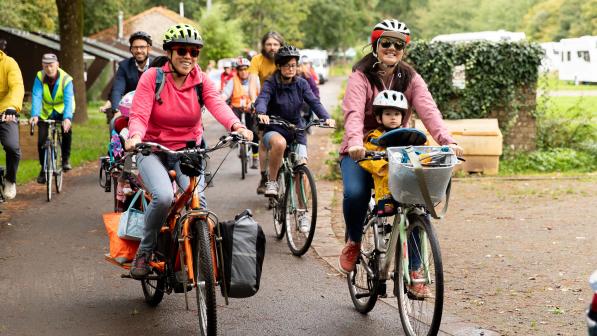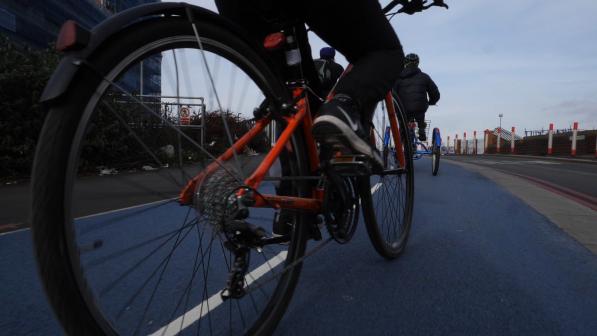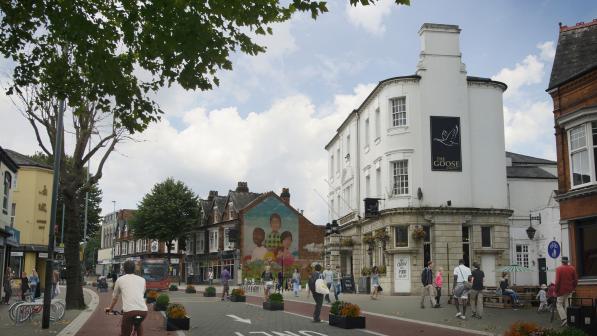MP's report calls for more cycling and walking to achieve Mission Zero

Fourteen months ago, Cycling UK, Pedal on Parliament and many others took the message to Glasgow that cycling fights climate change.
When you’ve been saying the same things for many years but decision makers still haven’t taken the necessary action, pessimism and campaign fatigue can set in, but after the 2021 United Nations Climate Change Conference (COP26) in Glasgow, I confess I felt more optimistic.
The iconic “This machine fights change” message went global, active travel was included in the COP26 transport declaration, and after lighting up iconic Glasgow locations to highlight the role of cycling in reducing carbon emissions, we’d joined others in the cycling bloc to pedal on COP. The question was how to maintain the momentum?
Can we afford to save the planet?
But as energy prices started to rise last year and a cost of living crisis engulfed us, sceptics like the Net Zero Scrutiny Group, who oppose many of the UK government’s net zero policies, started to argue that the UK couldn’t afford them, pushing for a re-think of the UK’s legally binding target of net zero carbon emissions by 2050 .
My optimism started to wane, as environmental and financial crises were framed as opposing priorities, when of course they aren’t, as Conservative MP Chris Skidmore so clearly outlined last week in his Mission Zero report.
Skidmore was commissioned by former prime minister Liz Truss to review the government’s delivery of net zero, to ensure that it was “pro-growth and pro-business”. Addressing the question of whether, in a cost of living crisis, we can afford to take the required climate action, Skidmore’s conclusion was that delaying climate action will actually hurt the economy.
Emotionally, I would prefer to argue the case for action on climate change from an environmental perspective, but in the current inflationary context, with a UK government focussed on growth and the economy, it’s vital to stress the longer-term economic benefits of interventions we support, as well as the environmental, health, wellbeing and societal benefits.
The need for long-term funding
So, Skidmore called for more consistent and ambitious government policies to deliver net zero, but what did he say about cycling and walking?
Well, a key recommendation at para 915 was that “the government commits to long-term funding for active travel, to ensure that more people will benefit”.
I pause there just to clarify that it’s the UK government which has the legally binding net zero commitment, although funding for active travel is devolved to the respective governments in Scotland, Wales and Northern Ireland. The principles and recommendations within Skidmore’s report are, however, relevant across the UK, regardless of which government is directly responsible for delivery.
Before recommending the need for long-term funding, the report outlines the current funding for active travel in England, but explains that stakeholders had highlighted the lack of long-term funding, and that the funding scheme (the Active Travel Fund - ATF), will only support certain local authorities. That creates winners and losers, as I outlined last year, in relation to the one-year funding allocations under ATF tranche 3, for the current financial year.
Stop-start hasn’t ended
Short-term competitive funding rounds make it extremely difficult for local authorities to plan long-term to deliver connected active travel networks, or to develop the internal capacity needed to deliver quality schemes.
That concern was recognised in the Department for Transport’s (DfT) 2020 Gear Change vision for cycling and walking, which included a commitment (page 24) that:
“We will create a long-term cycling and walking programme and budget, like the roads programme and budget. Delivering good schemes needs a pipeline of assured funding. We will end the stop-go nature of previous cycling and walking funding, allowing local authorities and others to plan in a long-term way”.
But English local authorities still only had one year funding from the DfT this financial year, and no confirmation that ATF tranche 4 funding for the next financial year will move to multi-year funding.
And only this week, we had another round of one-off funding announcements, some of which will support active travel schemes, following another competitive bid process, this time through the latest allocations from the Levelling Up Fund.
More one-off schemes
So, the Levelling Up fund is a UK-wide fund, the scope of which enables local authorities to bid for money for one-off schemes, which may or may not be related to cycling and walking.
Many have no active travel link, but a quick skim down this summary list prepared by the Local Government Chronicle identifies a number from the 105 successful bids which appear to do so, including funding for:
- Cornwall
- Lancashire County Council
- Norfolk County
- Blackburn with Darwen Borough Council
- Great Yarmouth Borough Council
- Redcar and Cleveland Borough Council
- Herefordshire
- Canterbury City Council
- North Lincolnshire Borough Council
- Colchester Borough Council
- London Borough of Lewisham
- Richmondshire District Council .
- Gwynedd Council
- Conwy County Borough
- Tees Valley Combined Authority
- Neath Port Talbot County Borough Council
- Isle of Anglesey County Council
- Broxtowe Borough
- Devon County Council
- Northumberland County Council
- Dundee City Council
- West Devon Borough
- Cheshire West and Chester Council
- Allerdale Borough
- Slough Borough
- London Borough of Camden
There’s a brief summary of each within the LGC article but, in reality, we don’t have any understanding for most of the bids and schemes which incorporate an active travel element of:
- How much of the funding will be spent on the active travel part of the bid.
- Whether it will be a high-quality scheme designed to the required standards.
- Whether that fits with the local authority’s network plans and is a priority scheme for them, of just one which fitted the bill for this particular fund.
- Whether the schemes funded by the UK government in Wales and Scotland, where active travel funding is otherwise devolved, would have met the criteria for or been priorities for the devolved government funding.
If you’re reading this and live in one of the areas receiving Levelling Up funding for a scheme with an active travel element, and you know more about what’s planned and whether it’s supported by local groups, cyclists and campaigners, please feel free to let us know.
I’m not suggesting that there’s no good news for cycling infrastructure investment within these funding allocations, just that it’s hard to know either way from a list following a one-off competitive bid process.
More importantly, if any government wants to help local authorities develop long-term plans and active travel networks, this is just the wrong process, because it only enables them to deliver individual schemes, rather than a wider strategic plan.
And back to climate change
I realise I’ve segwayed from how cycling fights climate change to the Mission Zero reports and its warnings that delaying action will cost the economy more, recommendations for long-term funding for active travel, to the stop-start, competitive and one-off funding local authorities are currently dealing with.
But there’s a common thread.
We won’t tackle climate change and achieve the required reductions in carbon emissions from transport without long planning and long-term funding, and delaying that will cost us more in the long run, as the Mission Zero report makes clear.
And local authorities won’t be enabled to plan and deliver the connected active travel networks needed without long-term funding, and doing that is one of the ways to tackle climate change.
It's time for governments to look longer term, especially when it comes to funding the solutions to climate change, including more people walking and cycling rather than driving.
Otherwise, as Chris Skidmore points out, it’ll just cost us more, in so many ways, in the long run.



